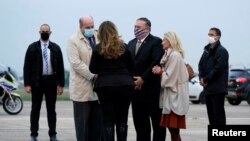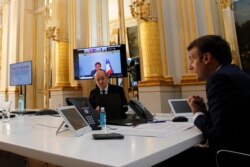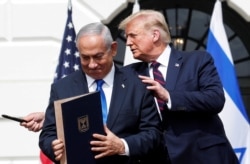U.S. Secretary of State Mike Pompeo arrived in Paris Saturday, his first stop on a 10-day, seven-nation trip to Europe and the Middle East that will focus on counterterrorism and religious freedom.
The trip comes nearly a week after Joe Biden became the projected winner of the U.S. presidency, with the leaders of many nations, including those where Pompeo is traveling, congratulating the president-elect. For his part, when asked about working with the Biden transition team, the secretary of state told reporters earlier this week that, “there will be a smooth transition to a second Trump administration.”
After making the comment, Pompeo said the State Department would be prepared to be successful “with the president who’s in office on January 20,” without mentioning President-elect Joe Biden.
Asked at a phone briefing Friday previewing the trip whether Pompeo would talk to his hosts about plans for a second Trump administration, a senior State Department official said Pompeo remains the secretary of state.
"We have continuity of government and Secretary Pompeo remains focused on the mission."
In Paris, Pompeo was to meet with President Emmanuel Macron, Foreign Minister Jean-Yves Le Drian and other officials “to build on our transatlantic work on economic and security matters, and on counterterrorism and global threats,” according to the State Department. A senior State Department official said Pompeo will participate in a wreath laying ceremony to honor the victims of the recent terrorist attacks in France.
Next, he will travel to Istanbul, Turkey to meet with Eastern Orthodox Church Patriarch Bartholomew to “discuss religious issues in Turkey and the region and to promote our strong stance on religious freedom around the world.” Pompeo will not be meeting with any Turkish government officials while in Istanbul. Asked if that should be viewed as a snub from Ankara, a senior State Department official told reporters it "was just a scheduling issue" and that Turkish leaders have their own travel plans at the time of Pompeo’s visit.
From there, Pompeo will travel to Tbilisi, Georgia, where he will meet with officials to underscore U.S. support for the country’s territorial integrity and sovereignty and to urge more democratic reforms. He will also meet with Patriarch of the Georgian Orthodox Church Ilia.
From Georgia, Pompeo will head to Israel for meetings with Prime Minister Benjamin Netanyahu. The two will discuss the Abraham Accords, which normalized relations between Israel and the United Arab Emirates and led to normalization with other Arab countries. Pompeo and Netanyahu are also expected to discuss joint efforts to counter Iran.
Pompeo will then travel to the UAE, where he will meet with Crown Prince Mohammed bin Zayed “to discuss security cooperation and regional issues.”
Next, he will go to Qatar to meet with the emir, Tamim bin Hamad Al Thani, and Deputy Prime Minister and Minister of Foreign Affairs Mohammed bin Abdulrahman Al Thani “to discuss bilateral and regional issues, including the importance of Gulf unity.”
The last stop is scheduled to be in Saudi Arabia, where Pompeo will meet with Crown Prince Mohammed bin Salman.
A number of diplomats and foreign policy experts were perplexed by Pompeo's refusal to acknowledge the election results, which show Biden, who was the Democratic candidate, with a projected insurmountable victory in the electoral college, despite President Donald Trump's legal challenges in several states.
Brian Katulis of the Center for American Progress spoke to VOA about the reaction among experts to the statement from the country’s top diplomat.
"So it was one of sadness, regret, not really alarm, because I think people see that there's an inevitability here that a transition is going to happen to a Biden administration."
Asked if Pompeo will face some awkward moments during the trip due to the blocked transition, Katulis said it will not be a victory lap for him.
"So I think Secretary Pompeo will have somewhat of a lame duck status himself. Most countries and diplomats I've been talking with, they're more interested in talking to the incoming team and not the one that's outgoing."








